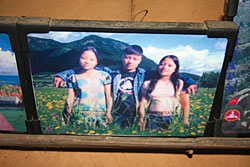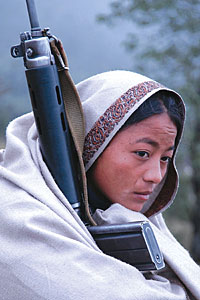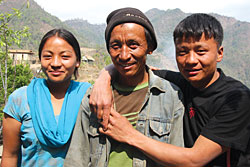 FAMILY PORTRAIT: The picture of Bhuwan posing with his sisters in happier times hangs in the family home in Khotang . |
She is married now, but her husband and young son live far away in Sankhuwasabha. Juna's sister, Guna (known by her war name, Comrade Sujata) lives with her in the camp in Udayapur. Guna has seen a lot of action, and was wounded many times. Juna herself was nearly killed by an exploding grenade during the battle for Bhojpur in 2004 in which her commander and 20 others were killed.
Guna and Juna have a brother, Bhuwan and during the war he was in the then-royal Nepal Army. Juna says she never really saw the Army as her enemy. But what if she had encountered Bhuwan on the battlefield? "We'd have to answer bullets with bullets."
Juna had lots of questions in the drive up from Udayapur to the Rai home in Khotang for a family reunion. The mountains were dry and eastern Nepal looked like a dust bowl. "I'm very happy to be meeting my brother after a long time," says Juna as we begin the walk after crossing the Sun Kosi. Chunauti becomes Juna again when she meets an old friend, Nirmala Magar, on the trail. Nirmala is not political but says she feels good her former classmate joined the rebels "because all the villagers support the Maoists".
 SAGAR SHRESTHA |
Brother and sister greet each other matter-of-factly, like most Nepali siblings. Their widowed and remarried father, Kumar, is very kind to everyone but there is something sad in his smile.
The next morning Bhuwan, a handsome, muscular man whose wife lives here in the village, is ploughing. He speaks more from the heart than his sister. He joined the NA not only because of a military tradition in the family (his grandfather was in the British army and his uncle in the Indian) but also to resist Maoist attempts to recruit among villagers.
When his sisters joined the rebels, he was shocked. "I told them to complete their studies and not to join the Maoists. I didn't like the Maoists. I felt bad that we were born of the womb of the same mother." It was impossible to meet his sisters during the war. And he was deeply troubled by his own colleagues in the army who threatened to arrest his sisters. They did try to detain them, but couldn't find them. He was also afraid they may meet on the battlefield. "I heard that they took part in the same attacks as me, in Diktel, Udayapur and Bokse. They said they saw me, but I didn't see them."
 CHARLES HAVILAND Three years after the war ended, Bhuwan and Juna embrace their father . |
Now, in Kumar's face you can see the delight that his children are together again. The siblings' emotions are harder to detect. "To some extent there was distance between us," is all Bhuwan will say about their relationship during the war. Juna is much more forthcoming. "We can't compare the war period with the present because it is like comparing sky and earth," she says. "Yes, our ideologies may be different but we're from the same family. We have a blood relationship."
Juna is optimistic that one day the two of them will be part of the same army. Bhuwan says "I'll have to see." The two pose with their father for a family portrait. They could be any family. As I snap Kumar between his two children, Bhuwan flings his arms around his father. Juna hesitantly puts her arm on her father's shoulders, with her hand resting delicately on her brother's.
READ ALSO:
Bhuwan and Juna - FROM ISSUE #454 (05 JUNE 2009 - 11 JUNE 2009)


